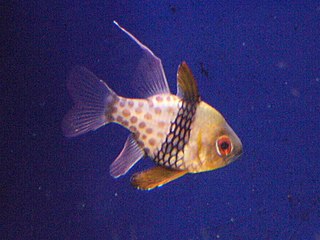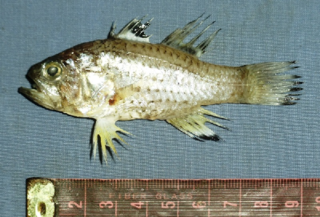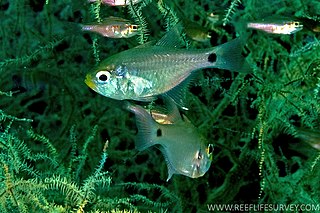
Cardinalfishes are a family, Apogonidae, of ray-finned fishes found in the Atlantic, Indian, and Pacific Oceans; they are chiefly marine, but some species are found in brackish water and a few are found in fresh water. A handful of species are kept in aquariums and are popular as small, peaceful, and colourful fish. The family includes about 370 species.

Apogon is a large genus of fish in the family Apogonidae, the cardinalfishes. They are among the most common fish on coral reefs. Over 200 species have been classified in genus Apogon as members of several subgenera. Some of these subgenera, such as Ostorhinchus, have been elevated to genus status, leaving just over 50 species in the genus.

Sphaeramia is a genus of the Apogonidae (cardinalfishes). They are marine fish that live in shallow tropical reefs in the Indian and Pacific Oceans

Cercamia is a genus of fishes in the family Apogonidae, the cardinalfishes. They are native to the Pacific and Indian Oceans.

Cheilodipterus is a genus of fishes in the family Apogonidae, the cardinalfishes. They are native to the Indian Ocean and the western Pacific Ocean.

Foa is a genus of fishes in the family Apogonidae, the cardinalfishes, native to the Indian and Pacific Oceans.

Fowleria is a genus of fishes in the family Apogonidae native to the Indian and Pacific Oceans. The name of this genus honors the American ichthyologist Henry Weed Fowler ( ) of the Academy of Natural Sciences of Philadelphia, who attended Stanford University, where he was a student of David Starr Jordan's.

Gymnapogon is a genus of fish in the family Apogonidae. They are native to the Indo-West Pacific and central Pacific Oceans, where they occur in reefs and nearby habitat types. These species are usually no more than 5 centimeters long and have semitransparent bodies without scales. The genus name is a compound noun formed by combining the Greek gymnos meaning "naked", referring to the lack of scales in the type species, Gymnapogon japonicus, and Apogon, the type genus of the Apogonidae. One species, the B-spot cardinalfish, is notable for its larvae being rather large, conspicuous and fast-swimming.

Jaydia is a genus of fishes in the family Apogonidae native to the western Pacific Ocean.

Lepidamia is a genus of fishes in the family Apogonidae, the cardinalfishes.
Neamia is a genus of cardinalfishes native to the Indian Ocean and the western Pacific Ocean.

Ostorhinchus is a genus of ray-finned fish in the family Apogonidae native to the Indian and Pacific Oceans.

Pristicon is a genus of cardinalfishes native to the western Pacific Ocean.
Pseudamia is a genus of cardinalfishes native to the Indian and Pacific oceans.

Rhabdamia is a genus of cardinalfishes native to the Indian and Pacific Oceans.

Siphamia is a genus of cardinalfishes native to the Indian and Pacific Ocean. Several of these species are commensal with various species of sea urchins.

Zoramia is a genus of cardinalfishes native to the Indian and Pacific Ocean.

Archamia bleekeri, also known as Gon's cardinalfish, is a species of fish in the family Apogonidae, the cardinalfishes. It is native to the coastal waters of the Indian Ocean and the western Pacific Ocean from Africa to Indonesia and from Taiwan to Queensland, Australia. This species occurs in mangrove forests and reefs, and is an inhabitant of shipwrecks, preferring silty areas with muddy or sandy substrates. This species grows to a total length of 10 cm (3.9 in). This species is the only member of the genus Archamia. The other species were moved to the new genus Taeniamia in 2013.

Taeniamia is a genus of cardinalfishes native to the Indian Ocean and the western Pacific Ocean.

Fibramia is a genus of fishes in the family Apogonidae from the Indian Ocean. The first fossil record of this genus is Fibramia keralensis from the Burdigalian (Miocene) of southwestern India.




















